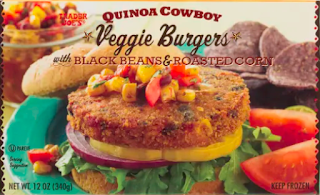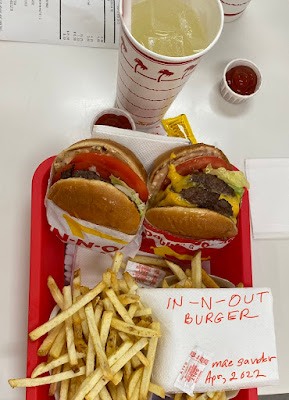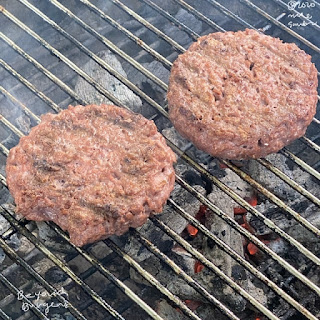"Beyond and Impossible meats are two different brands of plant-based meats that taste exactly like real meat—or close enough. The Impossible Burger even "bleeds" like meat, and is made mostly from soy, coconut oil, sunflower oil and natural flavors. Beyond Meat's key ingredients include water, pea protein, expeller-pressed canola oil, refined coconut oil and rice protein." (Source: Is Impossible Meat Bad for You?)
 |
| A less-meat-like meat substitute: veggie burgers. Not bad, just not like meat. |
 |
| One thing we try to give up: Fast Food like In-N-Out Burgers. Shown here with lemonade to share with Elizabeth's blog party. |
Impossible Meat or Beyond Meat and Health
 |
| Beyond Burgers on our grill, May, 2020. We decided to reduce our meat consumption two years ago. |
The indisputable fact: Impossible Meat is ultra-processed. I've written about industrial food processing dozens of times, and generally explain why I avoid such products -- ultra-processing implies the use of numerous unfamiliar additives, and such foods couldn't be made in a home kitchen. This is all the more true of the lab-grown meat substitute, though the imitations are slightly lower in calories and much lower in fat content. I choose to eat Impossible meat occasionally, though, because the risk isn't high, and our avoidance of meat for ethical reasons is strong. I would especially be pleased if it was more commonly available at the fast-food places where I go when driving cross country!
"Impossible Meats have been fortified with vitamins and minerals and do contain some micronutrients, but the reality is that processed foods are not as nutritious as unprocessed foods." (Source: Is Impossible Meat Bad for You?)
A bit more on the question of eating ultra-processed meat substitutes:
"Critics of plant-based meat have also pointed out that it tends to be highly processed. No doubt, most plant-based meats are not health foods, due to their high saturated fat and salt (though beef and pork, too, are high in saturated fat). But “processed foods” is a vague and often ill-defined term that encompasses everything from high-fructose corn syrup to whole-grain pasta to yogurt, and has little bearing on foods’ environmental impact. As Vox’s Kelsey Piper has written, the term 'processed food' 'can obscure more than it clarifies' when it comes to the debate over plant-based meat." (Source: Yes, Plant-based meat is better for the planet)
I agree with the following statement from an article in Gizmodo:
"If you’re wanting a nutritious, heart-healthy meal, you can and should eat vegetables and whole grains and fruits and all the other stuff that everyone knows they should be eating.... The nutritional status of the Impossible Burger doesn’t matter, because, like a regular hamburger, it’s a treat. You shouldn’t eat an Impossible Burger every day, just like you shouldn’t eat a hamburger every day." (source: "Impossible Burgers Aren’t Healthy")
What these products are NOT: a more controversial type of imitation meat is not yet available: this extreme method employs cell cultures to grow meat and seafood in a lab (also to grow dairy products). These products are in development, but none of them is yet on the market, and the USDA is in process of considering how to regulate them to protect consumers and avoid misrepresentation of the product. (Cell-based meat and milk: wonders of modern food technology?)
The Health of the Planet
First, the claims for ecological responsibility: "Impossible Foods claims its soy-based burger uses 87 percent less water, takes 96 percent less land, and has 89 percent lower greenhouse gas emissions than a beef burger. Beyond Meat makes similar claims about its pea-based burgers."Ethics: The Welfare of Meat-Packing Workers
 |
| "How the Trump Administration Helped the Meatpacking Industry Block Pandemic Worker Protections," May 2020. An official report on recent Congressional hearings by the Select Subcommittee on the Coronavirus Crisis. (Online version here) |
The major finding of this report:
"Last year, the Select Subcommittee found that during the first year of the pandemic, infections and deaths among workers for five of the largest meatpacking companies—Tyson Foods, Inc. (Tyson), JBS USA Holdings, Inc. (JBS), Smithfield Foods (Smithfield), Cargill, Inc. (Cargill), and National Beef Packing Company LLC (National Beef)—were significantly higher than previously estimated, with over 59,000 workers for these companies being infected with the coronavirus and at least 269 dying. Internal meatpacking industry documents reviewed by the Select Subcommittee now illustrate that despite awareness of the high risks of coronavirus spread in their plants, meatpacking companies engaged in a concerted effort with Trump Administration political officials to insulate themselves from coronavirus-related oversight, to force workers to continue working in dangerous conditions, and to shield themselves from legal liability for any resulting worker illness or death."



23 comments:
I am very surprised at the plant-based substitutes that they have come up with. Very processed as you mentioned and some are worse for you than the real thing.
We don't buy beef from the store anymore. We buy local to support farmers. We also like that the meat is fresh and we know exactly what it was fed.
Interesting and informative post.
Happy Tea Day,
Kate
Very interesting post! I have yet to try either the Impossible or Beyond burger or "meat". We'll try it eventually, but I much prefer making up my own with ingredients that aren't high in fat content. As you say, it is a nice treat on occasion though. Happy T day!
I've bought Veggie Burgers before, but not the two you shared in your post. I feel bad for the chicken industry and, although I try not to eat chicken, if I must, I really want free range chicken whenever possible. I have photos of birds (chickens) that are kept in such small cages, they are not allowed to even turn around. As a result, their breasts get so large, they almost look like turkey breasts when they are processed. The photos I got make me never want to eat chicken again.
Thank you for this informative article. I appreciate it. I was well aware of the meat packing plants and their requiring workers to stay on the job or get fired, even if they were sick. Such a shameful way to treat employees. Thanks for also sharing this with us for T this Tuesday, Mae.
Sadly I haven´t seen it here (yet - well Germany is always behind) - I sure would love to give it a go.
Sad how it´s the same around the world in the meat industry.
I prefer Impossible Meat to Beyond. It is both a flavor and texture thing for me.
I never eat meat substitutes. I eat very little meat, but when I do, it's real and fresh, and apart from that I eat other things. Happy T Day, Valerie
Very interesting thoughts here, Mae. Wonder how workers are treated in the meat substitute factories? We should probably research the treatment in all the factories of everything we purchase. I love your thoughts and care for others. Thanks for sharing all this as it is definately something to think about. Happy T-day and Hugz
Hello,
I have not tried the Impossible Meat, I know my hubby the meat lover would not eat it at all. It is sad how employees are treated, not just the meat industry. Take care, enjoy your day!
Interesting post. I haven't tried either of these. People with thyroid issues shouldn't eat a lot of soy, so that is one reason I haven't tried the Impossible Burger. I do like veggie burgers though, and I'm with you about processed foods. I guess when I am going to eat meat I'll stick with real meat. It is probably better just to eat less meat overall and skip high processed foods. Interesting about the meat packers too. Happy T day. hugs-Erika
Years ago if someone was a vegetarian they were "generally" very slim because they "generally" ate foods that were close to nature/unprocessed and "whole" foods, but now if you look at a vegetarian or a vegan they are not necessarily slim anymore (and I include myself in this btw). The number of vegetarian/vegan junk foods that are available to them is partly to blame, as is the number of processed meat substitutes, processed cheese substitutes etc. Vegan cheese is made from a bunch of chemicals and coconut oil mostly and heavily processed, as is the almond milk, soy milk, etc etc. I do think these substitute products can be helpful for those people trying to transition from meat to no meat but maybe not something to continue to eat long term. Much better to make your own no-meatballs, veggie burgers etc where you can be sure what is in them and how processed they are than to rely on these fake foods for any length of time. Happy T Day Elle/EOTC xx
We buy meat from local farmers here. Good recipes, and food choices.
(ツ) from Cottage Country Ontario , ON, Canada!
Thank you for sharing such an informative post. We have many meat substitutes here but I don't buy them.
This post is absolutely brilliant. Years ago, many years ago, I was vegan and did buy plant based meats. I, like you, didn't care for all of the processing. It felt like I was defeating my whole purpose of eating right. So I started making my own meat. It may not taste like beef but it is very tastey and even Mr. M. will eat it. LOL. As for trump, you really don't want to get me started. Have a wonderful day.
Very interesting post. I haven't tried any of the meat substitutes. Himself tried Burger King's Impossible Burger and said it was pretty good. Happy T Day
Interesting, Mae. I haven't tried the impossible meat yet -- but my friend Kate has started making her own burgers and she and Mike are really enjoying them on the grill. Thanks for all the info!
I've never been drawn to meat substitutes. When I want meat that's what I eat, though the problems in the production of meat products are many :( I tend to like veggies as they are and don't want them disguised.
Happy T Tuesday
Well , thats the most information i've consumed about those lab grown meats. I appreciate the information. I can appreciate the benefits for the planet and i appreciate the fact you pointed out that they are not necessarily a 'healthy' alternative.. The few times i actually eat beef.. most of the time it is chicken or turkey or fish , .. i think i will just stick to beef.. Happy happy T day to you!! hugs! deb
We usually have some kind of vegeburger once a week - some homemade some bought. There are some that have a very soft texture and some are a firmer texture. I must say my favourite is Beyond burger - I only buy them when they are on special offer! Happy T Day, Chrisx
Really interesting post. We've experimented with the "Beyond" brand, and decided we just didn't like it. Haven't tried "Impossible" -- I suppose we should. We don't eat that much meat, so we rationalize meat consumption that way. But there is such a wide range of meatless dishes out there to make, that I could probably drop meat from my diet entirely and be perfectly happy. Well, mostly happy. :-)
I'd rather simply reduce the amount of meat we eat rather than replace it with a substitute.
Interesting post - I have not tried the Impossible brand yet and not sure if our markets has it. I've been vegetarian several times in my life and sometimes it last 2 years and another it almost 12 years. It's healthier for sure! Now we are back to eating chicken and beef but not everyday. I'd like to incorporate more meatless meals in our menu again.
I really love the taste of the Impossible burgers and sausages. As a vegan, it was a real treat until I became aware of how ultra processed and high in fat the product is. Since I try to consume a fairly clean diet, I am not even comfortable eating it once in a while- not because it doesn't have the nutrients in it, but because it is actually not healthy to eat such a highly processed, high fat food. I did find a "perfect burger" manufactured by Dr. Praeger that has less fat than the Impossible burger and tastes just as good. Thanks for a very comprehensive look into this Impossible meat..
You add a lot of good info here that I'm sifting through ... So much to know ... but in general cut your real meat consumption as much as possible!
Post a Comment